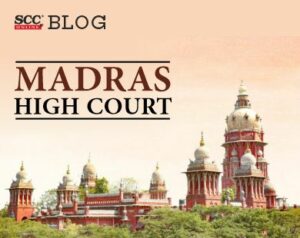Madras High Court: In a writ petition filed for issuance of writ of mandamus directing the respondents to give the equal status to atleast 30% of women amongst the advocates seeking conferment of Senior Advocate status from the lists issued by the Permanent Secretariat for Designation of Senior Advocate (‘PSDSA’) by a notification issued by the Registrar, the division bench of M.Sundar and N. Sathish Kumar. JJ held that the designation of Senior Advocate is only an honour and privilege based on various criteria, as set out in the Rules and the directions issued by the Supreme Court in Indira Jaising(supra). Further, one cannot claim as a matter of right to designate him/her as a Senior Advocate. Similarly, the conferment of the designation as Senior Advocate is not a post, for that one cannot seek reservation.
The Court said that the writ petition is not entertainable and the same deserves to be negatived aby giving the following reasons:
- The writ petitioner has no locus, as he is neither an applicant nor an aggrieved person whose rights have been affected.
- Conferring the status of Senior Advocate on an Advocate by Section 16 of the Advocates Act, 1961 (‘Act’) is a privilege and not a post. Therefore, any prayer for reservation is misplaced.
- Out of total 161 candidates who have applied, only 9 women candidates were selected, and 2 of them chose not to go for the interaction with Permanent Committee. Thus, the plea for 50% or at least 1/3rd reservation for women has no legs to stand.
-
All the 9 women candidates submitted their papers as per the Madras High Court Designation of Senior Advocates Rules, 2020 (‘Rules, 2020’) and this means that they have accepted to go by said Rules which do not provide for reservation of any kind. Therefore, the argument qua reservation is clearly a non-starter.
The Court relied on Indira Jaising v. Supreme Court of India, (2017) 9 SCC 766 and said that this case is a substratum of the said Rules and does not suggest any reservation, and this by itself takes the wind out of the sails qua reservation argument.
The Court said that the argument that the full Court alone has the prerogative to decide on the privilege of designation qua Senior Advocates is clearly not good enough qua reservation, as Section 16 of the Act talks about High Court, and if High Court is to be construed as full Court, the Advocate General and the designated Senior Advocate do not form part of the full Court. Therefore, in Indira Jaising(supra) a system by judicial pronouncement was put in place.
Placing reliance on Rule 5(1)(a) of the Rules, 2020, said that there is no distinction between a candidate recommended by the Chief Justice and a candidate recommended by a permanent Judge. Further, there is complete parity in four modes of proposals and methods of submission of application for designation.
Further, it said that the argument that all 161 names should be placed before the full Court is contrary to Rule 7(5) of Rules, 2020, and the argument that the interpretation of Rule 7(5) should be referred to Chief Justice in accordance with Rule 11 was rejected, as there is no ambiguity in Rule 7(5).
The Court, to trace the history and evolution of the powers of the High Court to designate an Advocate as a Senior Advocate, placed reliance on the Letters Patent, 1865, the Advocates Act, 1961 and Federal Court of India Rules, 1937.
The Court noted that the Law Commission of India in its 14th Report (1956) said that it should be left to the Supreme Court and the High Court to invite a member from the Bar for conferring such a designation, instead of asking the Advocates to make an application. This finally culminated under Section 16 of the Legal Practitioners Bill, 1959, which was later enacted as Section 16 of the Advocates Act, 1961.
The Court noted that designating an Advocate as a Senior Advocate is a matter of honour and privilege conferred upon a member of the Bar and cannot be based on reservation. It must be purely based on the merit cum ability and successful career of the member of the Bar irrespective of the gender.
Placing reliance on P.B. Sahasranaman v. Kerala High Court, 2017 SCC OnLine Ker 27817, wherein the issue was, whether an Advocate can consider it to be his right to be declared as a Senior Advocate or can he claim as a matter of right to be declared as a Senior Advocate. The Court said that it is a subjective decision though based on objective considerations and held that such a claim cannot be made as a matter of right.
Further, the Court relied on T.N. Raghupathy v. High Court of Karnataka, 2020 SCC OnLine Kar 93, wherein it was held that the Permanent Committee only makes an overall assessment of the candidates and the ultimate power to designate an Advocate as a Senior Advocate lies with the full Court of the High Court. The full Court can take a contrary view if necessary. Further, the Writ Court cannot sit in appeal over the marks given by the Permanent Committee.
Thus, the Court dismissed the writ petition.
[S. Lawrence Vimalraj v. Registrar, 2022 SCC OnLine Mad 6088, decided on 23-12-2022]
Advocates who appeared in this case :
For Petitioner: Advocate B. Ravi Raja;
Advocate M. Sivakumar;
For Respondents: Advocate M. Santhanaraman.
*Apoorva Goel, Editorial Assistant has reported this brief.

